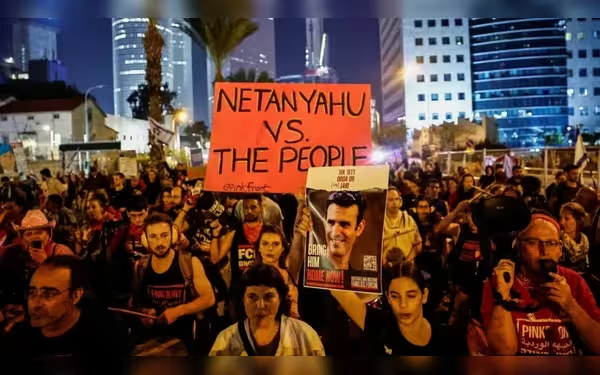Monday, November 25, 2024 06:55 AM
Netanyahu Faces Legal Challenges Amid Ongoing Conflicts
- Netanyahu faces ICC arrest warrants for alleged war crimes.
- Legal troubles could impact Israel's leadership and conflicts.
- Support for Netanyahu rises amid perceived external threats.
 Image Credits: thefrontierpost
Image Credits: thefrontierpostIsraeli PM Netanyahu faces ICC arrest warrants, raising concerns over his leadership amid ongoing conflicts in Gaza and Lebanon.
In recent developments, Israeli Prime Minister Benjamin Netanyahu finds himself in a precarious situation, facing legal challenges that could significantly impact his leadership and the ongoing conflicts in Gaza and Lebanon. The International Criminal Court (ICC) has issued arrest warrants for Netanyahu and his former defense chief, Yoav Gallant, citing alleged war crimes and crimes against humanity related to the prolonged Gaza conflict. This unexpected move by the ICC has raised eyebrows and stirred discussions about the future of Netanyahu's political career, especially as he is set to testify in a corruption trial that has been a thorn in his side for years.
Netanyahu has consistently denied any wrongdoing, asserting that he has acted in the best interests of Israel. Despite the serious nature of the allegations, he has garnered support from various political factions within Israel, particularly following the ICC's decision. Analysts suggest that this support may stem from a sense of national unity in the face of perceived external threats. Yonatan Freeman, an expert in international relations, noted that Israelis often rally around their leaders when they feel the world is against them, indicating that the ICC ruling may inadvertently strengthen Netanyahu's position.
However, the implications of the ICC's actions extend beyond domestic politics. A senior Israeli diplomat expressed concerns that the arrest warrants could hinder efforts to negotiate a ceasefire with Hezbollah in Lebanon and complicate the return of hostages held by Hamas in Gaza. The diplomat emphasized that the ICC's decision has emboldened groups like Hezbollah and Hamas, potentially increasing the stakes in any negotiations.
While Hamas has welcomed the ICC's ruling, there is little indication that it will leverage this situation to pressure Israel, especially given the significant losses both groups have suffered in recent conflicts. The stark contrast between how the war is perceived in Israel and abroad highlights a disconnect; Israelis are primarily focused on their own casualties and believe their military has made efforts to minimize civilian harm.
Michael Oren, a former Israeli ambassador to the United States, suggested that the ICC's actions might lead to a more aggressive military stance from the Israeli government. He pointed out a prevailing sentiment among Israelis that if they are being condemned for their actions, they might as well intensify their military efforts.
As Netanyahu prepares to face the corruption trial, which has been delayed multiple times due to the ongoing conflict, he stands accused of bribery, fraud, and breach of trust. Critics argue that he has prolonged the Gaza conflict to avoid facing the court, a claim he vehemently denies. The fallout from the October 7, 2023, Hamas attack, which resulted in significant casualties, has further eroded public trust in his leadership.
Despite the mounting legal challenges, Netanyahu has resisted calls for an independent investigation into the government's handling of the war, opting instead for a politically controlled inquiry. This decision has drawn criticism and is believed to have prompted the ICC to take action against him.
As Netanyahu navigates this turbulent landscape, he joins a small group of leaders who have faced similar legal predicaments, including Libya's Muammar Gaddafi and Serbia's Slobodan Milosevic. The arrest warrants pose a significant risk for Netanyahu, as traveling to any of the 124 countries that recognize the ICC could lead to his arrest. However, he can still visit the United States, which is not a member of the ICC, and Israeli officials are reportedly seeking support from Western nations to disregard the warrants.
Netanyahu's legal troubles are not just a personal crisis; they have broader implications for Israel's political landscape and its ongoing conflicts. As the situation unfolds, it remains to be seen how these legal challenges will influence both Netanyahu's leadership and the future of peace negotiations in the region. The coming months will be crucial, not only for Netanyahu but for the stability of Israel and its relationships with neighboring countries.













